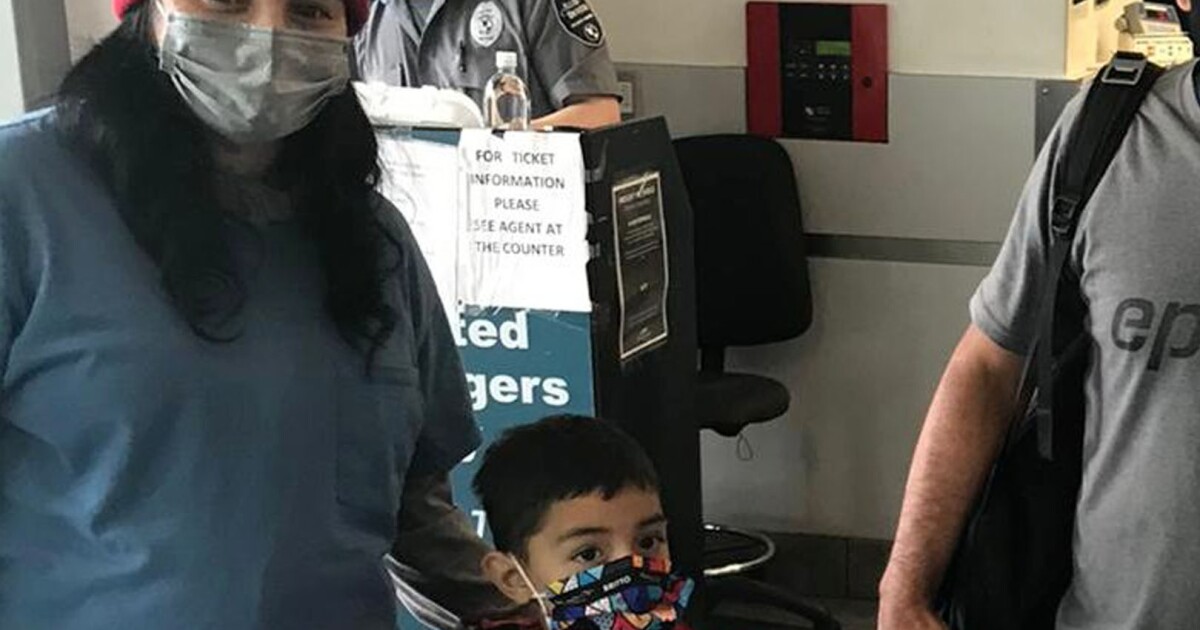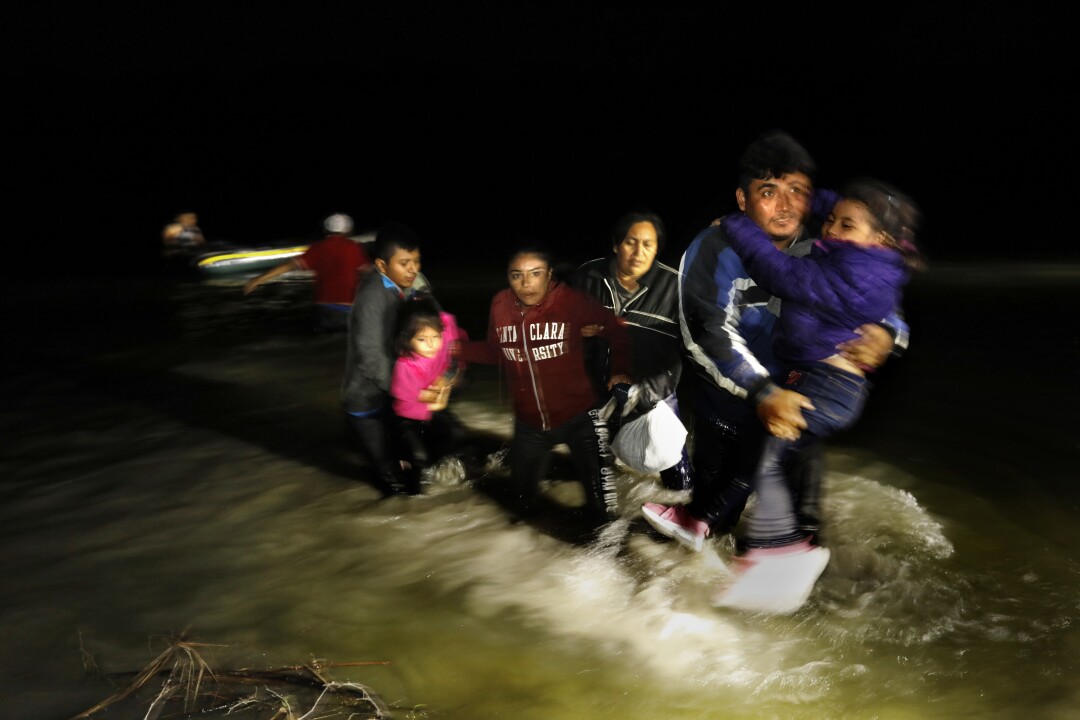Biden Title 42 policy fuels migrant family kidnappings at border, extortion in U.S.

With shaking hands, Karen Cruz Caceres manages to hit record on the call.
“How many days have you gone without food?” she asks into the phone.
Tani, her younger sister, is heard sobbing. “Help me,” she gets out.
Cruz Caceres assures her: “I am going to pay today. I’ll make another deposit.”
The April 1 call ends abruptly, and Cruz Caceres stops recording.
A week before the recording, Cruz Caceres, a single mother from Honduras who won asylum in Tennessee, had gotten another call that upended her already precarious life: Kidnappers in Nuevo Laredo, Mexico, had abducted her pregnant sister Tani and Tani’s 4-year-old son, and they wanted more than $20,000, according to a video recording of the call and messages reviewed by the Los Angeles Times. The family asked The Times not to use her sister’s last name, for fear of retribution from the kidnappers in Mexico and gangs back home.
Tani, 33, and her son were kidnapped on March 25, Cruz Caceres and lawyers said — just after U.S. authorities expelled them from Texas alongside other mothers and children under a Trump-era pandemic policy known as Title 42, which President Biden has continued.
Karen Cruz Caceres with her son in a Car.
(courtesy of Karen)
The unprecedented policy, which relies an obscure 1944 public health statute to indefinitely close the border to “nonessential” travel, has made migrant children and parents easy prey for the criminal groups waiting just on the other side. Biden’s continued reliance on Title 42 to quickly remove the vast majority of migrants at the southern border without due process contrasts with his pledge to restore “human dignity” to a U.S. immigration system targeted by former President Trump.
“My sister and my nephew were told they were going to kill them and feed them to the dogs,” Cruz Caceres told The Times. “If [U.S. officials] want to deport them back to their country, why don’t they do it now like prior presidents did?” she asked. “Why dump them to try their luck in the most dangerous cities in Mexico, to get abducted by kidnappers?”
The abduction of migrants in northern Mexico and the extortion from U.S. family members isn’t new, lawyers, experts and officials told The Times — what’s new is the reliance on Title 42 to expel thousands of these already vulnerable families, leaving them at the mercy of kidnappers and other criminals.
‘A gold rush for human smugglers’
Since the Trump administration implemented Title 42 in March last year amid a global pandemic, U.S. border officials have carried out more than 630,000 expulsions under the policy, some 240,000 since Biden took office in January, according to a Times analysis of the latest government data.
The Times interviewed several Central American mothers who said they tried to seek asylum with U.S. border agents but instead were removed to Mexico from California, Arizona and Texas, then kidnapped along with their young children, accounts backed by relatives in the United States who said they faced extortion for their release and by lawyers assisting the families.
Attorneys, advocates and researchers who connected The Times with the mothers said they’ve encountered scores of kidnappings and attacks on migrants subjected to Title 42. Human Rights First, along with fellow advocacy organizations Al Otro Lado and Haitian Bridge Alliance, has documented roughly 500 such cases in Mexico since January alone.

Children who have been expelled to Mexico after crossing the border with their parents into the United States reach to get a pastry.
(Carolyn Cole / Los Angeles Times)
“They know this is happening,” Nicole Ramos, an attorney with Al Otro Lado, who helped Cruz Caceres’ family, said of U.S. border officials. The migrants are “literally being kidnapped at their door as soon as they’re being expelled.”
Before Trump, and now Biden, U.S. authorities did not forcibly send asylum seekers and non-Mexicans to Mexico. But with the United States on pace to “encounter” more migrants at the border this year than any in the last 20, according to the Department of Homeland Security, Biden administration officials have doubled down on the mass expulsions under Title 42 in order to try to keep numbers down and political pressure at bay.
Under the policy, U.S. officials are rapidly expelling thousands of Central American children and parents, the vast majority with relatives in the United States, to some of the world’s most dangerous cities, often hundreds of miles from where they crossed the border, with no one to receive them, none of their belongings, and scant warnings about what’s happening or where officials are taking them. And unlike Trump’s “Remain in Mexico” policy, which Biden ordered stopped on his first day in office, officials are expelling them with no U.S. court date or record of an asylum claim.
Much of the public’s attention on the border in recent months has focused on unaccompanied minors. And while the majority of those stopped and expelled since January were still single male adults, U.S. authorities also carried out nearly 32,000 expulsions of migrant children and their parents. More than half — including Tani and her toddler — occurred just last month.
“The consequence of Title 42 is that this is essentially a gold rush for human smugglers,” said immigration lawyer Andrew Free, who represented Cruz Caceres in her asylum case.
On Tuesday, Homeland Security Secretary Alejandro N. Mayorkas announced a new cross-government effort to combat transnational criminal organizations and smuggling networks that “put profit over human life and routinely prey on migrants.” Asked how the operation would address Title 42 incentivizing these same kidnappers and traffickers, Mayorkas told The Times on a press call that the policy would stay in place until it “is no longer needed.”
“It is a public health imperative not only to protect the American public but also to importantly protect the migrants themselves,” he said. “We have a responsibility to both elements of this: to ensure public safety and the public health through the tools at our disposal, and also to address criminals who seek to take advantage of that situation.”

Adults and children who were sent to Mexico soon after crossing the border.
(Carolyn Cole / Los Angeles Times)
At least three federal judges have determined that the Title 42 policy is probably unlawful. United Nations officials and U.S.lawmakers — including then-Sen. Kamala Harris — have said Title 42 violates U.S. and international law guaranteeing the right to seek asylum and prohibiting the government from returning persecuted people to harm.
The State Department warns citizens to “reconsider travel” to Mexico “due to crime and kidnapping,” putting Tamaulipas, the Mexican state bordering Texas to which Tani was expelled, at the same level of danger as Syria and Iraq.
Still, in Biden’s first news conference as president last month, he said he’d like to send more families back under Title 42. The administration is fighting a lawsuit challenging the expulsion of migrant children and their parents, even as the Mexican government objects to taking more, citing a new law that prohibits detaining them.
“Why are some not going back? Because Mexico is refusing to take them back,” he said. “They should all be going back.”
‘How much could you get?’
Cruz Caceres saved the strangers’ contact information in her phone as secuestradores — kidnappers. Their icon on WhatsApp appears to be a gagged girl. Cruz Caceres’ is an illustration of Jesus carrying a girl on his back.
“It’s $10,800 for the two here in Mexico,” one of the purported kidnappers texted in Spanish, according to messages reviewed by The Times, “and in San Antonio, another $9,600 for them both.”
“I am a single mom who works to survive here,” Cruz Caceres responded. “Have mercy and take less and give them to immigration, I beg you, sir.”
The kidnappers responded the next morning: “How much could you get?”

Karen Cruz Caceres’ messages with kidnappers in Spanish on the left. The English translation for the texts is on the right.
(Courtesy of Karen Cruz Caceres)
Cruz Caceres has faced threats before. Back inSan Pedro Sula, Honduras, her neighborhood was controlled by the 18th Street gang, according to testimony from her 2018 asylum case.
In 2005, Cruz Caceres’ husband joined COBRA, a controversial special operations police unit, which receives U.S. support. When he resigned because of threats and went into hiding, 18th Street members told her they would “rip the bodies of her and her son apart,” the testimony stated.
On Christmas Eve in 2015, Cruz Caceres and her son crossed into Texas. Shortly after in Honduras, her husband was shot, according to the testimony — he survived by pretending to be dead. They later split.
“Respondents’ claims were exceptionally well corroborated,” wrote the immigration judge in Tennessee who granted her and her son asylum.
U.S. law gives protection to those who can show they fear persecution based on race, religion, nationality, political views or membership in a particular social group, but less than 40% of asylum applicants win.
In Nashville, Cruz Caceres works seven days a week, both at McDonald’s and cleaning hotels.
“I have two arms and two hands; I work,” Cruz Caceres says proudly. “I’m not going to ask for handouts.”
In Honduras, 18th Street has continued to threaten her family, according to Cruz Caceres and lawyers helping them. Recent hurricanes destroyed their home, and 11 relatives, including her sister Tani, moved into one room, she said. When the family’s motorcycle was stolen, Tani reported it to the police. Soon gang members came to the door.
“They pointed a gun to her head and then to her belly — she is pregnant — and threatened to kill her and her son and partner too,” Cruz Caceres recounted.
With little more than the police report, Tani, her son and her husband fled north.
‘Sitting ducks’
Title 42 has exacerbated the pileup at the border that existed before Biden took office. In November, two hurricanes hit the Northern Triangle of Central America — Guatemala, Honduras, and El Salvador — adding to COVID-19’s devastation. Urged on by smugglers, others concluded they’d have a better shot with Trump gone.
It is also incentivizing repeat crossings, officials say. With no legal pathway to enter, but no adverse legal consequence to being expelled, migrants are increasingly turning to coyotes offering multiple tries for the price of one. Border agents take biometric information and perform a quick health check before forcing Mexicans and Central Americans back over the border — in 90 minutes on average, Trump appointees boasted — or flying others back.
Across from Texas’ Rio Grande Valley, the epicenter of the migration surge, Mexican officials are refusing to take back many families, especially with young children. U.S. officials have responded by sending them to the other side of the country to expel them. Since Biden’s inauguration, there have been at least 70 “ICE Air” flights from Brownsville, Texas, to El Paso and San Diego, expelling thousands of asylum-seeking families to Tijuana alone.
Criminal groups know that most migrants quickly expelled at the border, particularly families, have U.S. relatives who presumably can pay more. The kidnappers go through their phones looking for U.S. numbers, according to Julia Neusner of Human Rights First.

A father from Honduras who worked as an agricultural worker there holds his daughter as they wait to be processed by Border Patrol agents in Roma, Texas.
(Carolyn Cole / Los Angeles Times)
“Title 42 just leaves a bunch of sitting ducks for organized crime,” Neusner said.
In Tamaulipas, coyotes give migrants colored bracelets that dot the banks of the Rio Grande to identify those who’ve already paid to cross, or already paid their kidnappers.
The cartels ultimately benefit, because they control all major routes through Mexico, and everyone who uses them — migrant or smuggler — has to pay, said Guadalupe Correa-Cabrera, an associate professor at George Mason University and author of “Los Zetas Inc.”
But the cartels don’t necessarily run the kidnapping rings themselves, according to a Mexico-based official with Homeland Security Investigations, Immigration and Customs Enforcement’s investigatory branch, who requested anonymity for security reasons. They don’t have to. Cartels make millions merely charging tolls, whereas low-level human smugglers work in “very disjointed cells,” picking out migrants to kidnap as “targets of opportunity,” the official said.
It is difficult to know how many migrants expelled under Title 42 have been kidnapped and their family forced to pay extortion, because “a significant number of kidnappings for ransom go unreported,” the FBI said in a statement to The Times.
Generally, when it’s U.S. citizens facing extortion, the FBI has jurisdiction, and when it’s an immigrant in the U.S., it’s Homeland Security Investigations. But many victims, especially immigrants here illegally, don’t report, worried about family members’ safety and dealing with U.S. law enforcement or notoriously corrupt Mexican counterparts.
Meanwhile, Biden administration officials recently struck an agreement with regional governments to deploy security forces to stem migration — despite some being tied to kidnapping and killing migrants.
Still, the Homeland Security Investigations official urged families to report ransom attempts. “It’s a terrible situation for them to try and navigate themselves.”
‘DO NOT send anything through Western Union’
On March 24, Tani and her son crossed the Rio Grande in Reynosa, Mexico, across from McAllen, Texas, seeking out Border Patrol to claim asylum, according to Cruz Caceres and the lawyers. Tani’s husband would cross separately; they’d been told mothers with young children had a better chance.
Instead, the next day while Cruz Caceres was at work, she got an audio message from Tani: “‘Karen, they returned me. They returned me.’”

Karen Cruz Caceres’ sister Tani, her son and husband arrive in Memphis on April 13.
(Courtesy of Karen Cruz Caceres)
Border Patrol expelled Tani and her son in Nuevo Laredo, roughly 160 miles from where they’d crossed. They’d been kidnapped almost immediately after U.S. authorities left them at a bridge along with other women and children, Cruz Caceres and the lawyers said.
On March 31, the kidnappers sent Cruz Caceres 10 account numbers and names, along with detailed instructions for making payments, according to the messages shared with The Times and later Customs and Border Protection.
“If you put two deposits or more … I’m going to block them,” the kidnappers wrote. “DO NOT send anything through Western Union or Elektra.”
With U.S. financial institutions more responsive to investigators, money transfer services are the preferred method of payment by criminals “quick to adapt to ever-changing regulations,” the FBI said in a statement to The Times.
Cruz Caceres sent the kidnappers photos of deposit slips in $1,000 increments, the maximum allowed per day, money she’d borrowed. She said she reported the extortion to the FBI, but nothing happened. With prayer hands and thumbs-up emojis, she implored the kidnappers to let her sister call, to release them in a safe place and to give them a clave, or keyword, to prove they’d paid.
“I feel like I am dying of helplessness,” Cruz Caceres wrote The Times on April 2. “They will soon die if I don’t get them out of there.”
Taylor Levy, an immigration lawyer, says lawyers representing U.S. families facing extortion contact her weekly. Even if they report it, authorities such as the FBI usually won’t do anything, she said. She advises them to pay. “For the most part,” she said of kidnappers, “they are businesspeople.”
Days after Cruz Caceres paid the ransom, the kidnappers released Tani and her toddler in Monterrey, and they made their way back to Reynosa to join her husband.

An asylum-seeking family wades through water after smugglers told them to get out of the boat, so they wouldn’t get caught in Roma, Texas, in March.
(Carolyn Cole / Los Angeles Times)
‘A country like this’
Few deny the devastating consequences of Title 42 on immigrant families, but there’s disagreement over who’s responsible.
“If they didn’t expel asylum seekers into places like Reynosa where kidnapping is just as common of an industry as baking bread,” Ramos, the attorney for Al Otro Lado, said, “then we wouldn’t have all these families in the U.S. paying hundreds of thousands of dollars in extortion to cartels in Mexico.”
Andrew Selee, president of the nonpartisan Migration Policy Institute, said migrants know the risks of the journey, and being expelled. “Is Title 42 bad policy? Yes. Is it a necessary instrument to get to better policy? Possibly.”
On April 12, Customs and Border Protection officers at Reynosa allowed Tani, her toddler and her husband into the United States under humanitarian parole and released them to travel by bus from Texas to Tennessee. When they arrived in Nashville, her sister wasn’t there to greet them — Caceres Cruz had to work. Now there’s ransom debt to pay, and another asylum case to make.
Tani told The Times last week that her son is having nightmares. A U.S. doctor told her the baby due in a few months, another boy, is healthy.
She said, “I am happy he will grow up in a country like this.”



